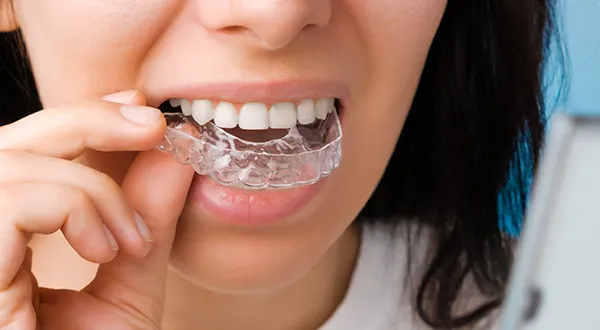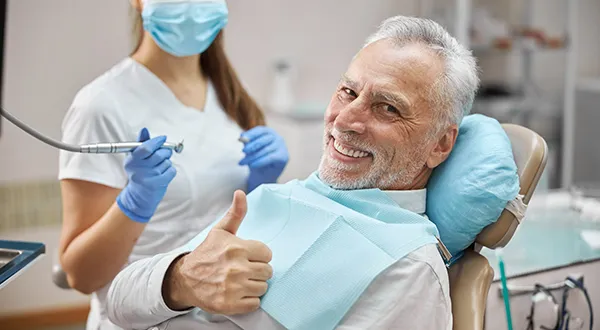Invisalign Treatment: Who Is a Good Candidate?
Dr. Hoss Abar
Are you someone who's been dreaming of having a perfect smile, but the thought of getting metal braces makes you cringe? Well, have you heard of Invisalign? It's the clear alternative to traditional metal braces and has helped millions of people achieve the smile of their dreams.
Whether you're an adult or a teenager, Invisalign may be your perfect solution. But the burning question is, who is a good candidate for Invisalign? Keep reading to find out! So, let's dive in and discover if Invisalign is the right choice for your smile.
What is Invisalign? Quick Overview:
Invisalign is an orthodontic procedure that uses a series of clear, custom-made aligners to straighten your teeth gradually. The aligners are practically invisible, making them popular among people who want discreet orthodontic treatment.
Invisalign is a highly effective treatment option that can help correct various orthodontic issues, including overcrowding, spacing, overbites, underbites, and crossbites. By addressing these issues, Invisalign can improve the overall health and function of the teeth and jaw while enhancing the smile's appearance.
With its comfort, convenience, and discreet appearance, Invisalign can help patients achieve their orthodontic goals with minimal disruption to their daily lives.
Benefits of Invisalign:
Invisalign offers a range of benefits that make it a popular choice for people seeking orthodontic treatment. Let's discuss a few benefits of Invisalign.
- Discreet:
If you're worried about the appearance of traditional braces, clear plastic aligners are a great option since they're nearly invisible.
- Comfortable:
Invisalign aligners are made of smooth, clear plastic, making them more comfortable than metal braces that irritate the cheeks and gums.
- Removable:
The aligners are removable, making maintaining good oral hygiene during treatment easy. Patients can remove the aligners, brush and floss their teeth, then pop them back.
- Custom-made:
The aligners are custom-made for each patient, ensuring a comfortable and snug fit.
- Faster treatment:
Invisalign treatment is typically shorter than traditional braces, with most patients achieving their desired results within 6 to 18 months.
- Fewer office visits:
Invisalign requires fewer office visits than traditional braces. So, it's a good option for people with busy work schedules.
- Less discomfort:
Invisalign is generally less painful than traditional braces. There are no wires or brackets like conventional braces to cause irritation or soreness.
- Versatile:
Invisalign can treat various orthodontic issues, including crowded teeth, gaps, overbites, underbites, and crossbites.
"Invisalign corrects a wide variety of orthodontic issues, including overcrowding, spacing, overbites, underbites, and crossbites. In a survey of Invisalign patients, 96% of respondents reported that their treatment successfully achieved their desired results".
How do you know if Invisalign is the right choice for you?
The effective way to know if Invisalign is best for you is to schedule a consultation with an Invisalign provider. During your consultation, your provider will evaluate your teeth and determine whether you're a good candidate for Invisalign.
Generally, Invisalign suits people with mild to moderate orthodontic issues, such as crooked teeth, gaps, overbite, underbite, and crossbite. Invisalign is also an excellent choice for folks who prefer a more discreet and pleasant orthodontic treatment than conventional braces.
Who is a Good Candidate for Invisalign?
Invisalign is typically a good choice for people with mild to moderate orthodontic issues who want a more discreet and comfortable treatment. Invisalign is also suitable for adults and teenagers who wear the aligners as prescribed and maintain good oral hygiene. Let's discuss a few factors that help determine if you're a good candidate for Invisalign:
- Mild to moderate dental issues:
Invisalign is best suited for such dental issues as crooked or crowded teeth, gaps between teeth, and mild bite problems. Invisalign may not be your best treatment option if you have severe dental issues, such as a significant overbite or underbite.
- Good oral hygiene:
Because Invisalign aligners are removable, having good oral hygiene habits is crucial throughout the treatment. You'll need to brush your teeth after every meal or snack and floss daily to prevent food and bacteria from getting trapped in your aligners.
- Commitment to wearing aligners:
Invisalign requires wearing your aligners for 20-22 hours daily. You must remove them only for eating, drinking, brushing, and flossing. If you're not willing to commit to wearing your aligners as directed, there may be better options than Invisalign.

- Willingness to follow treatment plan:
Invisalign treatment involves a series of aligners that must change gradually every few weeks to move your teeth into the desired position. It's important to follow your treatment plan as directed by your orthodontist to guarantee the best possible results.
- No allergies to aligner material:
Invisalign aligners have medical-grade thermoplastic material that is safe for most people. However, if you have a known allergy to this type of material, there may be better treatment options than Invisalign.
What to Expect During an Invisalign Appointment?
If you're considering Invisalign as an option for straightening your teeth, you may wonder what to expect during your dental appointment. Here's a step-by-step guide to give you an idea of what the process typically entails:
- Consultation with your orthodontist:
Your first appointment will typically be a consultation with your orthodontist. At this step, your healthcare provider will take dental X-rays and examine your teeth to determine if Invisalign is your best treatment option.
- Treatment plan:
If Invisalign is right for you, your orthodontist will create a plan outlining the expected treatment duration and the number of aligners you'll need.
- Impressions or digital scans:
Your orthodontist will take dental imprints or digital scans of your teeth to create custom aligners.
- Aligner fitting:
Once your aligners are ready, you'll have an appointment with your orthodontist to try them on and ensure they fit correctly. Your orthodontist will also give instructions on wearing and caring for your aligners.
- Follow-up appointments:
You'll consult your orthodontist every 6-8 weeks to check your progress and receive your new aligners. Your orthodontist may also make adjustments to your treatment plan as needed.
- Completion of treatment:
After you finish your Invisalign treatment, your orthodontist will give you retainers to ensure your new smile remains in its new position.

Who Isn't a Candidate for Invisalign?
While Invisalign is a popular orthodontic treatment option that works well for many people, there are certain situations where it may not be the best choice. Let's discuss some factors that make you unfit for Invisalign treatment.
- Age:
Invisalign is a viable option for teenagers and adults with all their adult teeth. Children who are still developing may not be good candidates for Invisalign, as their teeth and jaws are still growing and changing.
- Bridgework or dental implants:
If you have bridgework or dental implants in your mouth, Invisalign may not be your best treatment option.
- Jaw issues:
If you have significant jaw issues such as an overbite, underbite, or crossbite, Invisalign may not be the best treatment option. These problems often require more complex orthodontic treatment, such as braces or jaw surgery.
- Inability to wear aligners for prolonged periods:
It's essential to wear them for a minimum of 20-22 hours per day to ensure that your Invisalign treatment is successful. If you have difficulty wearing aligners for long periods, there may be better options than Invisalign.
- Not fully developed jaw:
Invisalign may not be your best treatment option if your jaw has not fully developed. Your orthodontist can decide if your jaw has fully developed and whether Invisalign is a good option.
Conclusion:
If you're interested in exploring Invisalign as an option for your orthodontic treatment, the best thing to do is to schedule a consultation with an orthodontist. They will be able to evaluate your dental health, analyze your treatment options, and assist you in determining whether Invisalign is a good fit for you.
With the right candidate and proper care, Invisalign can assist you in achieving the straight, beautiful smile you've always wanted.
Contact your Pinole dentist, Dr. Hoss Abar, DDS, MSD at Abar Orthodontics, to learn who is a good candidate for Invisalign Treatment.
Resource:
Introduction to Clear Aligners
*This media/content or any other on this website does not prescribe, recommend, or prevent any treatment or procedure. Therefore, we highly recommend that you get the advice of a qualified dentist or other medical practitioners regarding your specific dental condition.
More To Explore
About Us
We believe that every patient deserves to feel confident about their smile. Years of experience creating beautiful and flawless smiles.
Opening Hours:
Monday - Thursday: 8:00 AM - 5:00 PM
Friday: 8:00 AM - 12:00 PM
Saturday - Sunday: Closed
Abar Orthodontics, Pinole, CA
1500 Tara Hills Drive., Suite 204
Pinole, CA 94564
Abar Orthodontics, San Leandro, CA
145 East 14th street., #100
San Leandro, CA 94577
© 2026Abar Orthodontics | All rights reserved | Powered by:Vigorant, Inc.
